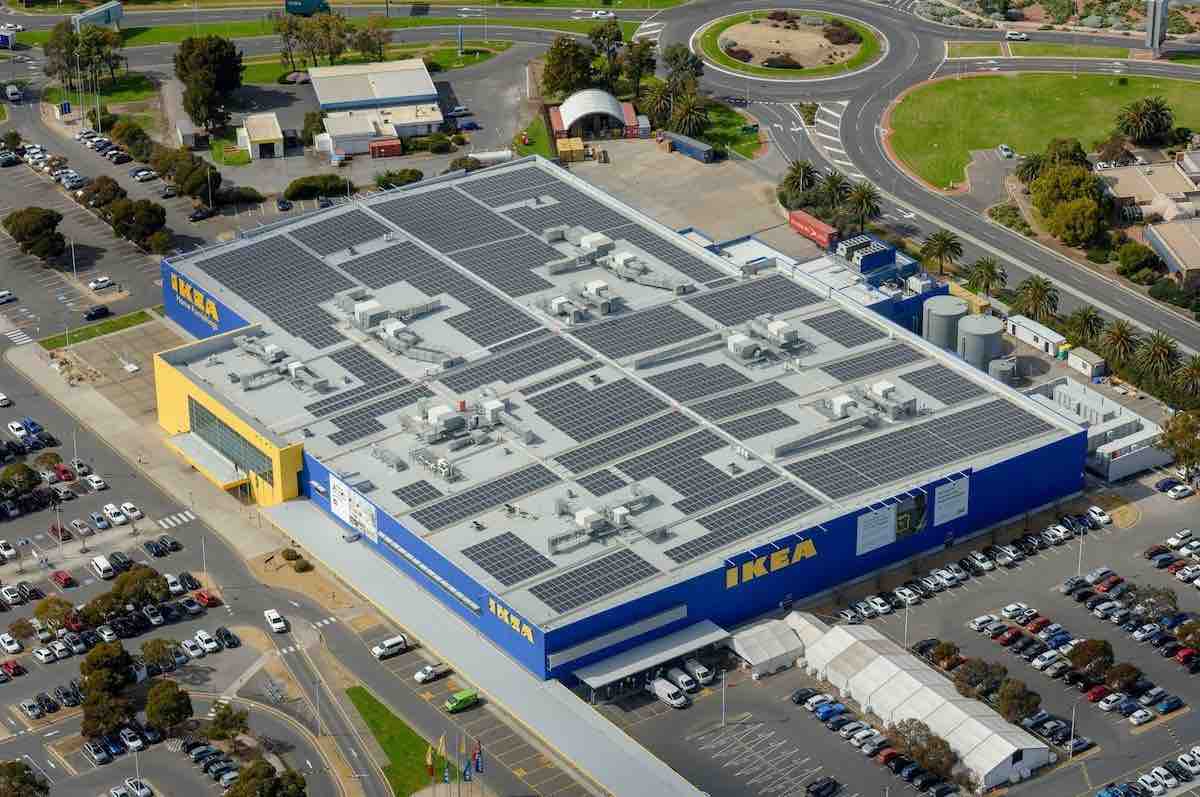

The IKEA eleXsys Microgrid’s3MW/3.45MWh battery which can store and trade surplus clean energy into the South Australian network during hours of peak demand. Image supplied
Australia’s largest urban, commercial-scale, rooftop solar-powered microgrid was launched on Wednesday at Adelaide’s Ikea store, consisting of over 3,000 solar panels and a 3MW/3.45MWh battery.
The new $6.6 million Ikea eleXsys Microgrid was officially commissioned on Wednesday and is now powering 70% of Ikea’s Adelaide store. The largest grid-connected urban microgrid in Australia, the new project consists of 3,024 solar panels generating 1.2MW and a 3MW/3.45MWh battery the size of three 40-foot shipping containers.
Designed and built by Planet Ark Power, the solar and storage microgrid will now be owned and operated by Epic Energy.
“IKEA is committed to becoming a circular and climate-positive business, but we can’t do it alone,” said Peter Richmond, Ikea Australia’s sustainability lead.
“This microgrid project is the perfect example of collaboration between the business community, industry, and government to help shift the dial on clean energy production in Australia.”
Development and construction of the microgrid was undertaken as part of a collaboration between Ikea Australia, Planet Ark Power, Epic Energy, SA Power Networks, and the South Australian government.
In addition to helping to stabilise the South Australian power grid, the microgrid will free up enough electricity from the state’s network to power 370 homes a year and is expected to save 890 tonnes of CO2 each year.
“The microgrid not only maximises clean energy generation in SA, but also avoids expensive network upgrades and provides grid support to the state’s electricity network, benefitting the wider South Australian community,” said Jonathan Ruddick, Planet Ark Power chief financial officer.
Backed by a $1.95 million grant from the South Australian government’s Renewable Technology Fund, the microgrid will help to better manage the local network while improving the quality of power to nearby homes and businesses.
“South Australia has led the nation in adopting solar, with more than 40% of households now having a rooftop system. Increasing numbers of businesses are also realising that installing solar is a sensible investment,” said Tom Koutsantonis, South Australian minister for energy and mining.
Sophie is editor of One Step Off The Grid and deputy editor of its sister site, Renew Economy. Sophie has been writing about clean energy for more than a decade.
This post was published on May 25, 2023 10:41 am
Iconic Australian hardware and garden store says it has reached 100 per cent renewables, with…
Data used to showcase the downward impact of renewable energy on power prices contained a…
Most so-called ‘community batteries’ are actually installed by electricity networks, but this local group managed…
Rising energy bills are driving a surge in complaints. The NSW Energy Ombudsman wants better…
Australians are often being misled when they try to make sustainable electrical appliance choices, and…
China EV giant bows to trend of offering "complete solutions" for home energy, with launch…